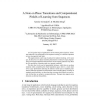Free Online Productivity Tools
i2Speak
i2Symbol
i2OCR
iTex2Img
iWeb2Print
iWeb2Shot
i2Type
iPdf2Split
iPdf2Merge
i2Bopomofo
i2Arabic
i2Style
i2Image
i2PDF
iLatex2Rtf
Sci2ools
114
click to vote
JIIS
2008
2008
A note on phase transitions and computational pitfalls of learning from sequences
An ever greater range of applications call for learning from sequences. Grammar induction is one prominent tool for sequence learning, it is therefore important to know its properties and limits. This paper presents a new type of analysis for inductive learning. A few years ago, the discovery of a phase transition phenomenon in inductive logic programming proved that fundamental characteristics of the learning problems may affect the very possibility of learning under very general conditions. We show that, in the case of grammatical inference, while there is no phase transition when considering the whole hypothesis space, there is a much more severe "gap" phenomenon affecting the effective search space of standard grammatical induction algorithms for deterministic finite automata (DFA). Focusing on standard search heuristics, we show that they overcome this difficulty to some extent, but that they are subject to overgeneralization. The paper last suggests some directions to ...
| Added | 13 Dec 2010 |
| Updated | 13 Dec 2010 |
| Type | Journal |
| Year | 2008 |
| Where | JIIS |
| Authors | Antoine Cornuéjols, Michèle Sebag |
Comments (0)

